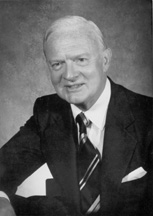Harry F. Byrd Jr.
Harry Flood Byrd junior (born December 20, 1914 in Winchester , Virginia ; † July 30, 2013 there ) was an independent American politician who belonged to the Democratic Party until 1970 . From 1965 to 1983 he sat in the US Senate for the US state of Virginia .
biography
Byrd was born in Winchester on December 20, 1914, the eldest child of Harry F. Byrd senior and his wife Anne. He had three siblings, two brothers and a sister. He was born into one of the first families in Virginia, and his ancestors can be traced back to colonial times. In 1931, Byrd enrolled at the Virginia Military Institute . Two years later he moved to the University of Virginia . In 1935 he left university without a degree to work for his father's newspaper, the Winchester Star . His father told him at the beginning of his career: If you make a mistake, you will be kicked out! . Byrd quickly established himself as an editor, almost a year after joining, he also took on the role of editor so that his father could concentrate on his political career in the US Senate. Despite everything, Byrd Sr. kept the reins in hand by continuing to control the newspaper's finances.
In 1936 Byrd went to the Harrisonburg Daily News Record , whose editor he was until 1941 and again from 1946 to 1981. On August 9, 1941, Byrd married Gretchen Thompson, with whom he had two sons and a daughter. Shortly after his wedding, Byrd signed up for military service, he fought for the US Navy in World War II , most recently with the rank of Lieutenant Commander . In 1945 he left the Navy. From then on he devoted himself to both the newspaper business and politics. Already in his youth, when his father was governor of Virginia, he accompanied him on trips through the state. His father was also his mentor. He quickly belonged to his father's closest circle of advisors. From 1948 until his appointment as a US Senator, Byrd was a member of the Virginia Senate . There he was chairman of the judicial committee.
In November 1965, Byrd's father announced his resignation as a US Senator, giving reasons for health. The then governor of Virginia, Albertis S. Harrison , named Byrd to succeed his father. In 1966 he won a special election , so he was able to bring his father's original term of office to an end. In 1970 there was a break with the Democratic Party and Byrd's resignation. The party demanded that elected officials take an oath on the upcoming presidential candidate. Byrd resisted that. He was of the opinion that you could not write a blank check without knowing the candidate and his election platform. In the Senate elections in Virginia, Byrd therefore ran as a non-party candidate. He was able to defend his seat clearly against candidates from the two major parties, and he was very popular in the state. He was the first non-party candidate who could hold a seat in the US Senate by voting. He continued to work with the Democrats, but showed quite conservative voting behavior, similar to his father. For example, he was in favor of strict fiscal discipline. In 1976 he was re-elected as a US Senator. During his time in the Senate, Byrd was a member of the finance and military committee. 1982 did not run again, in 1983 he consequently resigned from the Senate.
Even after retiring from active politics, he remained interested. For example, he supported Mitt Romney in the 2012 presidential election . His wife Gretchen died in 1989. On July 30, 2013, Byrd died of heart disease at the age of 98 in his home in the city of his birth. He was buried there in Mount Hebron Cemetery .
Web links
- Harry F. Byrd junior in the Biographical Directory of the United States Congress (English)
- Harry F. Byrd Jr. in the database of Find a Grave (English)
| personal data | |
|---|---|
| SURNAME | Byrd, Harry F. Junior |
| ALTERNATIVE NAMES | Byrd, Harry Flood junior (full name) |
| BRIEF DESCRIPTION | American politician |
| DATE OF BIRTH | December 20, 1914 |
| PLACE OF BIRTH | Winchester , Virginia |
| DATE OF DEATH | July 30, 2013 |
| Place of death | Winchester , Virginia |

